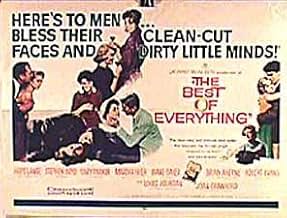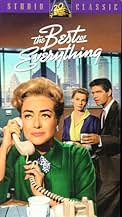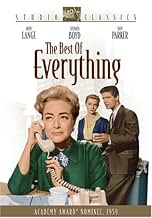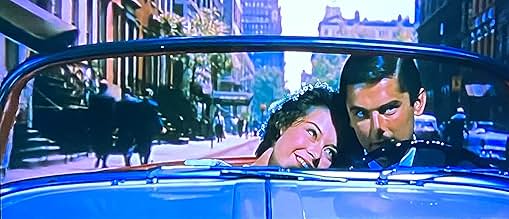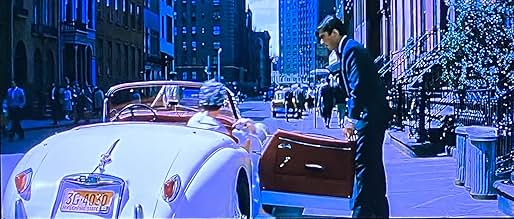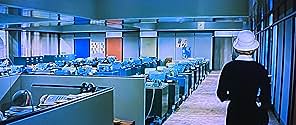IMDb रेटिंग
6.6/10
2.5 हज़ार
आपकी रेटिंग
अपनी भाषा में प्लॉट जोड़ेंAn expose of the lives and loves of Madison Avenue working girls and their higher ups.An expose of the lives and loves of Madison Avenue working girls and their higher ups.An expose of the lives and loves of Madison Avenue working girls and their higher ups.
- 2 ऑस्कर के लिए नामांकित
- 2 कुल नामांकन
Linda Hutchins
- Jane
- (as Linda Hutchings)
Ted Otis Sr.
- Dr. Ronnie Wood
- (as Ted Otis)
Gertrude Astor
- Leading Woman in Play
- (बिना क्रेडिट के)
Alan Austin
- Bill
- (बिना क्रेडिट के)
Joseph Bardo
- Policeman
- (बिना क्रेडिट के)
फ़ीचर्ड समीक्षाएं
Claire Booth Luce's "The Women" shows relationships with men through a woman's point of view in a play, (and 1939 film that also has Joan Crawford playing a bitch: a character who might have been Amanda Farrow 20 years before), that has no male characters. Here we see the male characters and what a bunch they are. They use women like toys and throw them away, leaving the women to suffer. Ironically, the women in "The Women", perhaps because they are all we see, are shown in a less than favorable light, alternately silly and scheming, with the only "nice" one, (Norma Shearer), growing "claws" by the end. In "The Best of Everything" we see the men for the cads they are while the women are largely innocent and vulnerable.
This is a film about women leaping from things. Diane Baker leaps from a car, (in perhaps the most absurd scene in cinema history, which is not in the book). Suzy Parker falls from a fire escape. The women in the film are leaping into the workplace, looking for success and love at the same time. Women would leap into the future and leave this type of soap opera behind in the next decade. But they would come back to it in the 80's and 90's through the novels of people like Sidney Sheldon and Judith Krantz, (although their trashier works aren't as good as this).
The best thing about this film is the way it looks. I love the glossy cinemascope films of the 50's and 60's. They look so much better than the pixel-challenged home movies we've been making since, especially in the letterboxed version we see on TV, and the DVD, with the picture so clear you could walk into it. The look of the bevy of young beauties in it is also memorable. This film probably has more beautiful women in it than any other. It has a supermodel, (Suzy Parker), a beauty queen, (Myrna Hansen, who was not Miss America 1954 as Rona Jaffe says in the DVD commentary but rather Miss USA 1953, per the IMDb: but so what), and a Playboy playmate, (June Blair, from January 1957). My vote goes to Suzy, one of the astonishing beauties of all time. Her acting here isn't as awful as people pretend: they are just reacting, as people did then, to the sight of a supermodel, (the first, really), trying to act. Nobody seemed to care how well she did. Her role, that of an apparently worldly woman who turns out to be the most vulnerable, is the most complex in the bunch and she does just fine.
The most touching thing about the film now is the age of the female leads at the time. Hope Lange was 27 when they filmed this in the spring of 1959. Diane Baker was 20. Suzy Parker was 26. Hope, who looked to be Grace Kelly's heir, never made it really big and wound up being Mrs. Muir on television and, per the IMDb, wound up living in a home with "crates for coffee tables" because she spent her money on causes she believed in before dying at age 72 in 2003. This film must have seemed a very distant and irrelevant memory to her by then. Baker, always a welcome face in 60's TV, (especially to Richard Kimble), and still active as an actress and acting coach, just turned 67. Parker found "the best of everything" with Bradford Dillman for 40 years before dying at age 70 the same year Lange did. But here they are, young, beautiful and ambitious for success and love, just like their characters.
This is a film about women leaping from things. Diane Baker leaps from a car, (in perhaps the most absurd scene in cinema history, which is not in the book). Suzy Parker falls from a fire escape. The women in the film are leaping into the workplace, looking for success and love at the same time. Women would leap into the future and leave this type of soap opera behind in the next decade. But they would come back to it in the 80's and 90's through the novels of people like Sidney Sheldon and Judith Krantz, (although their trashier works aren't as good as this).
The best thing about this film is the way it looks. I love the glossy cinemascope films of the 50's and 60's. They look so much better than the pixel-challenged home movies we've been making since, especially in the letterboxed version we see on TV, and the DVD, with the picture so clear you could walk into it. The look of the bevy of young beauties in it is also memorable. This film probably has more beautiful women in it than any other. It has a supermodel, (Suzy Parker), a beauty queen, (Myrna Hansen, who was not Miss America 1954 as Rona Jaffe says in the DVD commentary but rather Miss USA 1953, per the IMDb: but so what), and a Playboy playmate, (June Blair, from January 1957). My vote goes to Suzy, one of the astonishing beauties of all time. Her acting here isn't as awful as people pretend: they are just reacting, as people did then, to the sight of a supermodel, (the first, really), trying to act. Nobody seemed to care how well she did. Her role, that of an apparently worldly woman who turns out to be the most vulnerable, is the most complex in the bunch and she does just fine.
The most touching thing about the film now is the age of the female leads at the time. Hope Lange was 27 when they filmed this in the spring of 1959. Diane Baker was 20. Suzy Parker was 26. Hope, who looked to be Grace Kelly's heir, never made it really big and wound up being Mrs. Muir on television and, per the IMDb, wound up living in a home with "crates for coffee tables" because she spent her money on causes she believed in before dying at age 72 in 2003. This film must have seemed a very distant and irrelevant memory to her by then. Baker, always a welcome face in 60's TV, (especially to Richard Kimble), and still active as an actress and acting coach, just turned 67. Parker found "the best of everything" with Bradford Dillman for 40 years before dying at age 70 the same year Lange did. But here they are, young, beautiful and ambitious for success and love, just like their characters.
A classic late 50's film. The superannuated headliners (Joan Crawford and Louis Jordan) are not at their best, but the direction, cinematography, and acting of the younger cast are compelling. In a 50's sense (which I love).
The look and feel of the artsy (over-artsy?) contemporary film "Far from heaven" reflects exactly this sort of film (and I suspect this film may be one of the models). A silly plot, of course (hey, it's 1959!), but as a film-- glorious! As a reflection of the society, extremely interesting. And as witness to how Hollywood breaks away from the idealistic portrayal of American sexual mores, fascinating.
The look and feel of the artsy (over-artsy?) contemporary film "Far from heaven" reflects exactly this sort of film (and I suspect this film may be one of the models). A silly plot, of course (hey, it's 1959!), but as a film-- glorious! As a reflection of the society, extremely interesting. And as witness to how Hollywood breaks away from the idealistic portrayal of American sexual mores, fascinating.
Although dated, this film is definitely worth a watch. I saw it about eight times as a teenager when it opened and it changed my life...I just HAD to live in New York. It has great opening shots of the Manhattan skyline with Johnny Mathis crooning "Romance is still...the best of everything..." that rival those of West Side Story. There is a rather stilted performance by the world's REAL first Supermodel, Suzy Parker (sorry about that, Janice D.), but it's great eye-candy! It also offers a bit of insight into late 1950's American mores--our obsession with (and repression of) sex (in the workplace, no less!), romance, and marriage before women's lib. It represents an era in which New York was at it's finest and a super-bitchy performance by Joan Crawford is just the icing on the cake.
More equality today, much more, but overall nothing has changed. All the sad, tawdry, pathetic, moving and bitter moments between women and men in the office is just as it is today, less the blatant sexual harassment. Love looking at old pics of nyc and looking in store windows....things seem surprisingly familiar and not dated.
Caroline Bender (Hope Lange) is just killing time getting a job. Her real ambition is to marry Eddie and have a baby.
April (Diane Baker) is too innocent to stay that way for long and falls in love too easily, a dangerous combo.
Greg (Suzy Parker) is a go-getter and wants to be an actress.
All three are doomed for dramatics in 'The Best of Everything', a 1959 soap opera/morality play/sometimes solid movie that is aging by the second.
Set in the cut-throat world of paperback publishing, its not as trashy as "Valley of the Dolls" but not as vanilla as "Three Coins in the Fountain."
The men in the mix - Brian Aherne, Stephen Boyd, Louis Jourdan and Robert Evans - are slick, well-dressed and no good, for the most part. Aherne is the resident sexual offender - will pinch anything walking by, and makes unwanted advances right and left. His character is offensive as hell, but its not played seriously at all. Harassment hadn't been discovered yet, I guess. Boyd works there, too, although you never see him actually doing anything. He's too busy being older, wiser and drunker. Evans is abroad just so Diane Baker can suffer in style - he's a rich kid who's gotten her in 'trouble' so instead of marrying her, as promised, he's taking her to get an 'operation.'
Jourdan is a director who mistakenly has an affair with Parker. They share a fight scene which is fairly no-holds barred, in a movie like this anyway, but the scene is ultimately ruined by Parker's histronics. She ends up nearly stalking him, and she really didn't deserve such a lousy fate, her bad acting notwithstanding.
Joan Crawford breathes fire as Amanda Farrow, the resident 'witch' who is automatically rude and dismissive of any of her legion of secretaries. Well they are younger, aren't they? Isn't that sufficient reason to hate a person? Caroline doesn't think so, as she admirably stands up to Miss Farrow every chance she gets. Crawford only gets to let loose once, when she tells her married boyfriend 'you can your rabbit-faced wife can both go to hell' and slams down the phone. You never get to see the poor soul who dare crosses her.
Martha Hyer's 'storyline', as it were, is extremely weak, and she is painfully over-the-top as an unmarried mother. Short of wearing a huge "W" (for 'whore') on her cardigan, she walks around like a pathetic mess for most of her screen time. Even worse, she is not given the courtesy of having it all 'tied up', one way or the other, at the end. It won't matter that much, but still..
Its painfully obvious this all took place in a totally different world. People were nicer to one another for the most part and work was not a drag but something exciting, for a girl from outside NYC anyway.
One unconvincing drunk scene aside, Hope Lange helps it seem reasonably real as Caroline, who at least has more than one side to her character.
I admire that women are seen having an opinion, a chance and a choice. Not that its not wrapped in a nice bow, but it makes some points for equality. In 1959 that was probably noteworthy and possibly controversial. 7/10.
April (Diane Baker) is too innocent to stay that way for long and falls in love too easily, a dangerous combo.
Greg (Suzy Parker) is a go-getter and wants to be an actress.
All three are doomed for dramatics in 'The Best of Everything', a 1959 soap opera/morality play/sometimes solid movie that is aging by the second.
Set in the cut-throat world of paperback publishing, its not as trashy as "Valley of the Dolls" but not as vanilla as "Three Coins in the Fountain."
The men in the mix - Brian Aherne, Stephen Boyd, Louis Jourdan and Robert Evans - are slick, well-dressed and no good, for the most part. Aherne is the resident sexual offender - will pinch anything walking by, and makes unwanted advances right and left. His character is offensive as hell, but its not played seriously at all. Harassment hadn't been discovered yet, I guess. Boyd works there, too, although you never see him actually doing anything. He's too busy being older, wiser and drunker. Evans is abroad just so Diane Baker can suffer in style - he's a rich kid who's gotten her in 'trouble' so instead of marrying her, as promised, he's taking her to get an 'operation.'
Jourdan is a director who mistakenly has an affair with Parker. They share a fight scene which is fairly no-holds barred, in a movie like this anyway, but the scene is ultimately ruined by Parker's histronics. She ends up nearly stalking him, and she really didn't deserve such a lousy fate, her bad acting notwithstanding.
Joan Crawford breathes fire as Amanda Farrow, the resident 'witch' who is automatically rude and dismissive of any of her legion of secretaries. Well they are younger, aren't they? Isn't that sufficient reason to hate a person? Caroline doesn't think so, as she admirably stands up to Miss Farrow every chance she gets. Crawford only gets to let loose once, when she tells her married boyfriend 'you can your rabbit-faced wife can both go to hell' and slams down the phone. You never get to see the poor soul who dare crosses her.
Martha Hyer's 'storyline', as it were, is extremely weak, and she is painfully over-the-top as an unmarried mother. Short of wearing a huge "W" (for 'whore') on her cardigan, she walks around like a pathetic mess for most of her screen time. Even worse, she is not given the courtesy of having it all 'tied up', one way or the other, at the end. It won't matter that much, but still..
Its painfully obvious this all took place in a totally different world. People were nicer to one another for the most part and work was not a drag but something exciting, for a girl from outside NYC anyway.
One unconvincing drunk scene aside, Hope Lange helps it seem reasonably real as Caroline, who at least has more than one side to her character.
I admire that women are seen having an opinion, a chance and a choice. Not that its not wrapped in a nice bow, but it makes some points for equality. In 1959 that was probably noteworthy and possibly controversial. 7/10.
क्या आपको पता है
- ट्रिवियाJoan Crawford, recently elected to the board of directors of Pepsi after the death of her husband who had been President and CEO of the company, managed to swing a brief quasi product plug for the soft drink by having an unmistakable Pepsi machine (with the red, white, and blue Pepsi logo, but sans the word "Pepsi") installed in the secretaries' on-screen break room.
- गूफ़In the scene when Diane Baker tells Hope Lange "he's ten foot tall to me" while walking down the street, several people... two men and two young boys... look into the camera, smiling (they were obviously filming with a camera hidden in a car during these scenes as those people weren't extras).
- भाव
Amanda Farrow: Now you and your rabbit-faced wife can both go to hell!
- कनेक्शनFeatured in Playboy's Penthouse: एपिसोड #1.1 (1959)
- साउंडट्रैकThe Best of Everything
by Sammy Cahn and Alfred Newman
Johnny Mathis sings during the opening credits
Also sung by a chorus at the end
Played often in the score
टॉप पसंद
रेटिंग देने के लिए साइन-इन करें और वैयक्तिकृत सुझावों के लिए वॉचलिस्ट करें
- How long is The Best of Everything?Alexa द्वारा संचालित
विवरण
- रिलीज़ की तारीख़
- कंट्री ऑफ़ ओरिजिन
- भाषा
- इस रूप में भी जाना जाता है
- Las audaces
- फ़िल्माने की जगहें
- उत्पादन कंपनियां
- IMDbPro पर और कंपनी क्रेडिट देखें
बॉक्स ऑफ़िस
- बजट
- $25,00,000(अनुमानित)
- चलने की अवधि2 घंटे 1 मिनट
- रंग
- पक्ष अनुपात
- 2.35 : 1
इस पेज में योगदान दें
किसी बदलाव का सुझाव दें या अनुपलब्ध कॉन्टेंट जोड़ें


